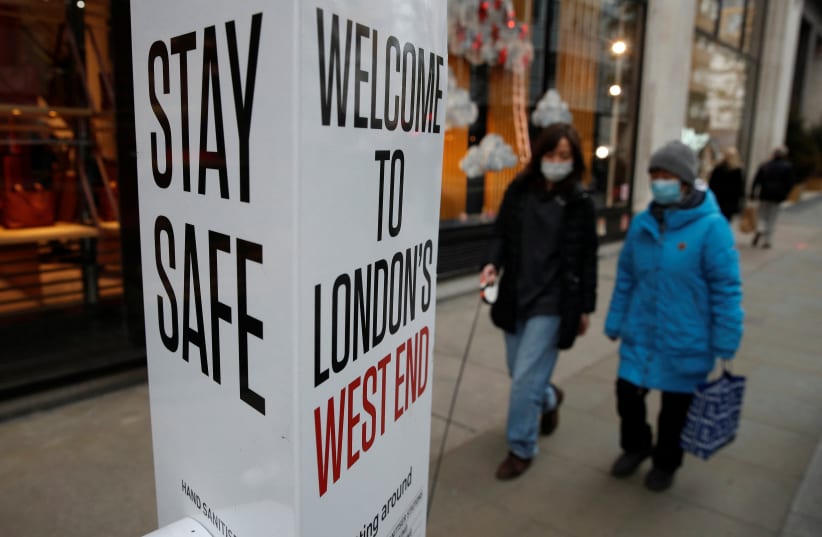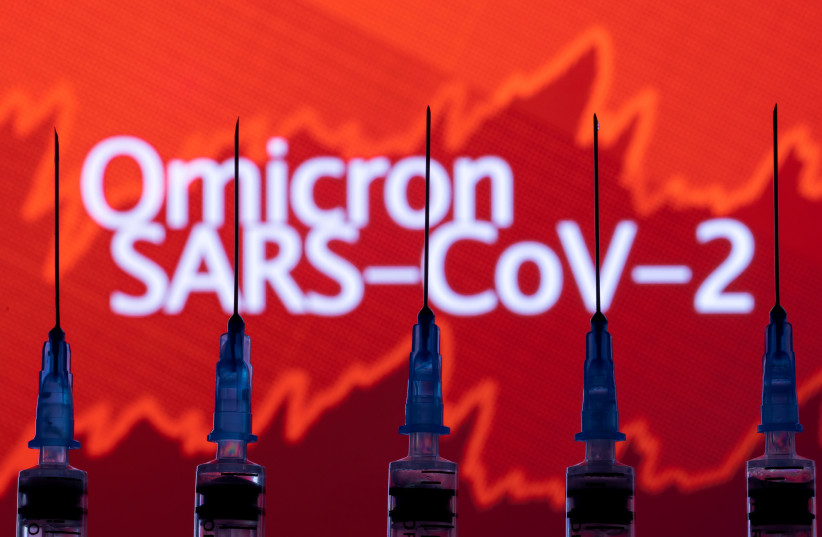The United Kingdom and Denmark will be labeled red and placed under a travel ban starting overnight Wednesday, the Health Ministry announced on Sunday. It also revealed that 15 more Omicron cases were identified in the country, bringing the total to 67.
Israelis cannot travel to red countries unless they obtain special permission, and when they return must quarantine for at least one week regardless of their immunization status. Currently, 50 African countries are on the list.
Also on Sunday, the cabinet extended by 10 days the travel restrictions approved at the end of last month to contain the Omicron variant. The measures were due to expire on Sunday night.
Israel will thus remain closed to all foreign nationals with very limited exceptions, and Israelis returning from all countries will continue to be required to quarantine for a minimum of three days if they are vaccinated and of seven if they are not. All inbound travelers need to take a second PCR test at the end of the quarantine period, after the one upon landing.
During a media briefing with the head of Public Health Services Dr. Sharon Alroy-Preis and Health Ministry Director-General Prof. Nachman Ash, Health Minister Nitzan Horowitz called the move a “difficult but necessary step,” and asked the public to avoid unnecessary trips.
The officials said more countries might be added to the list of red nations in the upcoming days, and the situation will be monitored daily. Alroy-Preis said Belgium was also going to be included in the list with the UK and Denmark, but eventually the ministry clarified that at this stage it won’t.
At the opening of the cabinet meeting, Prime Minister Naftali Bennett said Israel is going to try to delay the penetration of the Omicron variant as long as possible. He said morbidity in the country has continued to rise slightly, but no corona deaths had been registered for five straight days for the first time in almost six months.
“Two weeks ago, when we decided to tighten restrictions to enter the country following what was then a new corona mutation, some said we were exaggerating – and now everyone understands we were not,” Bennett said. “We already know that Omicron has arrived and is in Israel, but at the moment, following our measures, the numbers are still relatively small.”
The prime minister said that strictly monitoring Ben-Gurion Airport and the borders is crucial to prevent the cases from skyrocketing.
As of Sunday night, 67 Omicron carriers had been identified in the country, 12 more than Saturday. Forty-four of them had recently come back from abroad, from South Africa, the UK, France, the USA, the UAE, Hungary, Italy, Namibia and Turkey. Another 14 were infected after being in contact with returnees from South Africa, the UK and France, and nine contracted the variant in the community.
In addition, 13 were not considered protected from the virus (vaccinated or recovered), and 54 were considered protected.
Another 80 individuals were suspected of having contracted the variant, and were waiting for the result of the genetic sequencing of the tests.
Among all individuals identified as being Omicron carriers or suspected of it, 88 were asymptomatic, 54 symptomatic, and the status was not clear for five.
“Our strategy consists of two elements. One: to delay as much as possible the entry of Omicron into Israel through the tightening of the borders; and two: to take advantage of these valuable days to increase the immunization of all citizens of the State of Israel,” Bennett said. “The truth is that at the moment we are not sufficiently protected.”
Over one million Israelis are eligible to receive a booster shot. The Health Ministry is considering shortening the interval between the first two shots and the third from six to three months, to get more individuals protected. In addition, Ash confirmed that the ministry is checking the protection offered by the third shot, if there is a decrease, and when it could be necessary to give a fourth shot, especially to people in a high-risk group, such as individuals over 60.
The officials called on all parents to vaccinate their children.
So far, only 5% of five-year-olds and 9% of children age 6-11 have received at least one dose. Also, the 12-15 cohort, which was authorized to get the jab in June, remains the group with the lowest immunization rate – 60%.
In the past week, 42% of new cases were registered among children age 5-11, and another 9% among children 12-15. The rates have been stable for several weeks.
To increase the immunization rate, the government decided to start a vaccination drive in schools.
The authorities are also examining extending the Green Pass system to malls. The system grants access to certain venues and activities to those vaccinated, recovered or who underwent a corona test.
For the past few weeks, morbidity in the country has been moderately on the rise, although the rise in cases is caused by the Delta variant and not by Omicron.
In the week between December 5 and 11, an average of 595 cases were recorded every day; the previous week they were 518, the week before 509, and the week before that 456.
There were 223 new cases on Saturday, much fewer than on previous weekdays, but with a lower number of tests processed, as always happens on weekends.
For several days, the reproduction or “R” rate has fluctuated between 1 and 1.12, meaning morbidity is rising, albeit only slightly. On Sunday, the R was holding at 1.11.
The number of active cases stood at 5,800. Last month, cases had dropped as low as 5,000.
At the same time, serious morbidity remained limited. There were 94 serious patients as of Sunday. A week earlier they were 111.
The first studies about the Omicron variant suggest that while the third shot offers a good level of protection, the first two appear to be inadequate.
Researchers at Sheba Medical Center specifically checked the status of individuals vaccinated five/six months earlier, but did not check that of individuals jabbed with two doses in a more recent period.
OMICRON RESTRICTIONS:
- Vaccinated or recovered individuals returning from abroad have to quarantine for at least three days. On the third day they can undergo a second PCR test after the one upon landing and leave isolation after receiving a negative result.
- Individuals who are not considered protected against the virus returning from abroad have to quarantine for at least seven days. On the seventh day they can undergo a second PCR test after the one upon landing and leave isolation after receiving a negative result.
- Individuals returning from a red country must isolate in a coronavirus hotel until their first PCR test taken after landing return negative, then they can quarantine at home for at least seven days regardless of their vaccination status.
- Those who are found infected with Omicron have to quarantine for a minimum of 14 days instead of 10.

